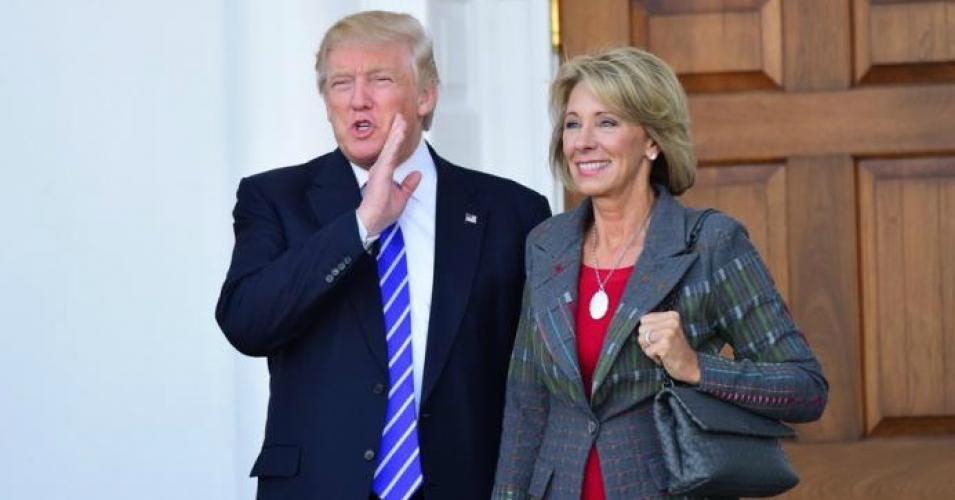
On November 23, 2016, President-elect Donald Trump picked Betsy DeVos as his nominee for the Secretary of Education. DeVos, the head of the Michigan Republican Party, was also a business-owner and noted philanthropist.
DeVos, born Elisabeth Prince, is the daughter of Edgar Prince, a billionaire who built his wealth off of auto parts. She attended Calvin College and graduated with a degree in business and political science. Later, she married into the DeVos family, the heirs of the Amway company. Amway is a massive multi-level marketing company, and Richard DeVos is worth $5.1 billion.
The DeVos’s are extremely politically active, each donating millions of dollars to the GOP over the last twenty years. They support conservative policies, especially those relating to school choice and voucher programs.
In March of 2016, Betsy DeVos spoke against Donald Trump, saying that he “does not represent the Republican Party.” However, just eight months later, Trump nominated DeVos amid many speculations to her aptitude for the position.
Many opponents immediately brought up a variety of questions and concerns. Past Secretaries of Education have typically been people involved in public education. For example, the most recent appointee was John King Jr.–King was a teacher, a managing director for a charter school, received a doctorate in educational administrative practices, was appointed Commissioner of Education for New York before finally becoming involved with the US Department of Education — still then, King rose up the ranks in the department before becoming the Secretary of Education under Obama.
By contrast, DeVos has held no educational positions, did not attend public school, and never held student loans. She now holds the highest educational position, over thousands of public schools, and heads the department that distributes the largest number of student loans.
Some senators have brought up worries about her outsider-status in the education realm. DeVos is also a proponent of “school choice”, voucher initiatives, and a greater number of charter schools.
School Choice is a concept where families are provided with alternatives to their normally districted school. Students and families choose whether to attend public, private, or other options, usually charter schools. The government allocates funding based on where the student enrolls–this means that federal funding “follows” students. If a student attends a public school, the public school receives funding; if private, the private school receives some funding.
This type of funding is known as a voucher. Students can use the voucher to pay for private school tuition, transportation, or supplies, which is often toted as a way to help low-income areas. Proponents of these programs say that it helps competition between schools and increases accountability. Detractors say it will lead to greater income-gaps, hurt already-failing schools, doesn’t help students with special needs, and will most likely result in a greater number of private religious schools.
DeVos met with the president-elect multiple times and was present at Trump’s inauguration, tweeting, “Honored to witness the historical Inauguration and swearing-in ceremony for the 45th President of the United States!”
Twitter immediately set to attacking DeVos, first grammatically correcting her tweet, fixing errors of tense, capitalization, redundancy, and prepositions. Many tweets questioned her ability to lead the nation’s education if she could not ably make a 140 character tweet.
Following Trump’s inauguration, DeVos began the confirmation process. On January 17, many Democratic senators questioned her ability and motives during her confirmation hearing. Many Democrats were angered by the time limits placed on each question by the Republican chair of the committee.
Vermont Senator Bernie Sanders directly asked DeVos if she thought she would have been nominated if not for her hundreds of millions of dollars worth of donations to the GOP. Sanders also questioned if DeVos would attempt to work towards tuition-free college, which the nominee deflected.
Massachusetts Senator Elizabeth Warren questioned DeVos’s lack of experience in both a large bureaucracy and an educational system. Connecticut Senator Chris Murphy asked DeVos if she would limit gun rights in schools–to which DeVos responded with a story about a grizzly attacking a school in Wyoming, saying that the school in Wapiti probably had a gun. Unfortunately for DeVos, there isn’t a gun–the school built a fence to deal with the chance of bears wandering onto the playground.
The committee passed a party-line vote to approve DeVos and send her nomination to the floor of the Senate. There, the contention between the two parties increased.
Forty-six Democrats and two Independents announced they would vote against DeVos, meaning the party vote would confirm DeVos, with the 52 Republicans voting aye and the 48 Democrats and Independents voting nay. Democrats held the floor the night of February 6 and 7 speaking against DeVos, asking Republicans to explain why they were voting for her.
Constituents in many red states inundated the offices of their Republican senators, some of which said they would decide based on what their constituents said. In the end, two Republicans, Senator Collins of Maine and Senator Murkowski of Alaska, switched sides. This brought the vote to an even 50 for and 50 against.
In a historic move, Vice President Mike Pence broke the tie, acting as the President of the Senate. DeVos was confirmed as the Secretary of Education on February 7.
DeVos faces some major obstacles in implementing her school choice programs. Some 37 states have laws prohibiting the use of federal funding in religious schools. Additionally, DeVos’s ethics review raised complicated questions about her finances possibly benefiting from her new position.
DeVos’s struggle for confirmation has been one of many in Trump’s presidency. Bill Clinton had three nominees confirmed the day he was sworn in; George W. Bush and Barack Obama had seven confirmed by their first day of office. On his first day in office, Trump had two.
By February 9, George W Bush had his entire cabinet confirmed, and Obama was only three positions away. At this point, Trump has eleven nominees who are yet to be confirmed.